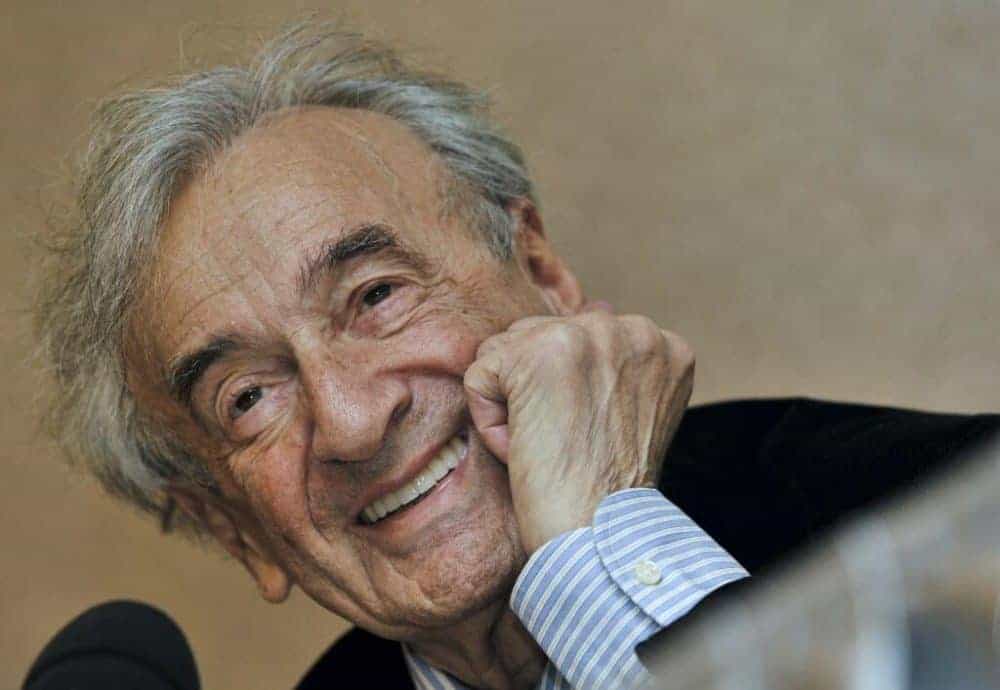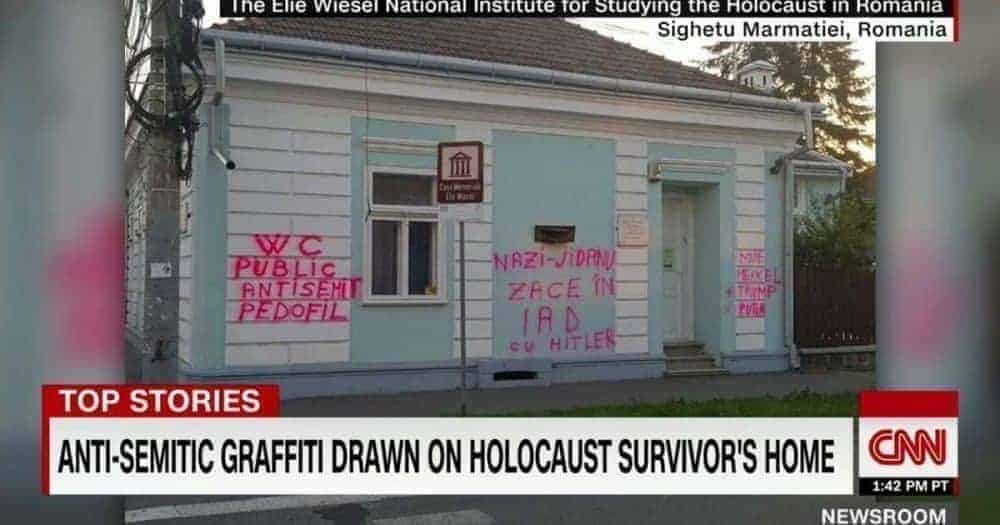
Romania: Police probe anti-Semitic graffiti at Elie Wiesel childhood home
Police in Romania are investigating anti-semitic graffiti(1) found on the walls of the house where Auschwitz survivor Elie Wiesel was born.
Cảnh sát ở Rumani đang điều tra những hình graffiti theo chủ nghĩa bài Do Thái được tìm thấy trên các bức tường của ngôi nhà nơi Elie Wiesel sinh ra – người đã sống sót qua trại tử thần Auschwitz.
Comments painted in pink included the remark that Wiesel, who died in 2016, was “in hell with Hitler”. They were quickly removed.
Những bình luận được sơn màu hồng nhận xét về Wiesel, người đã qua đời vào năm 2016, là “hãy xuống địa ngục cùng Hitler”. Chúng đã nhanh chóng bị xóa bỏ.
Wiesel became famous after writing about his teenage years in Nazi concentration(2) camps.
Wiesel trở nên nổi tiếng sau khi viết về những năm thiếu niên của mình trong các trại tập trung của Đức Quốc xã.
He devoted his life to ensuring Nazi atrocities(3) would not be forgotten.
Ông đã cống hiến cả đời mình để khiến cho những tội ác của Đức Quốc Xã sẽ không bao giờ bị lãng quên.
Police spokeswoman Florina Metes said officers were studying CCTV footage from the house, in northern Romanian town of Sighetu Marmatiei, where Wiesel was born in 1928.
Nữ phát ngôn viên cảnh sát Florina Metes cho biết nhân viên đang nghiên cứu camera an ninh (CCTV) từ ngôi nhà, tại thị trấn Sighetu Marmatiei ở phía bắc Rumani, nơi Wiesel được sinh ra vào năm 1928.
Auschwitz survivor Elie Wiesel dies
“This grotesque(4) act represents an attack not only on the memory of Elie Wiesel but on all the victims of the Holocaust,” said a statement by Romania’s National Institute for Holocaust studies, which is named after the writer.
“Hành động khiếm nhã này biểu hiện cho một sự xúc phạm không chỉ đối với ký ức về Elie Wiesel mà còn tất cả các nạn nhân của Holocaust”, trích dẫn theo Viện quốc gia Romania nghiên cứu về Holocaust, nơi mà được đặt tên theo nhà văn.
In 1944 Wiesel’s family was deported to Auschwitz, where his mother and one of his sisters were killed in the death camps(5). His father died at Buchenwald.
Năm 1944, gia đình của Wiesel bị trục xuất đến Auschwitz, nơi mẹ và một trong những chị em gái của ông bị giết trong các trại tử thần. Cha ông qua đời ở Buchenwald.
Wiesel’s use of the term Holocaust helped cement the word’s association with Nazi atrocities against the Jews.
Việc sử dụng thuật ngữ Holocaust của Wiesel đã giúp củng cố mối liên hệ của từ này với những tội ác của Đức Quốc xã khi chống lại người Do thái.
In 1986, he was awarded the Nobel Peace prize for his role in speaking out against violence, repression and racism.
Năm 1986, ông được trao giải Nobel Hòa bình với đóng góp của mình trong việc lên tiếng chống lại bạo lực, đàn áp và phân biệt chủng tộc.
After his death, the head of the World Jewish Congress said he was “undoubtedly one of the great Jewish teachers and thinkers(6) of the past 100 years”.
Sau sự ra đi của ông, người đứng đầu World Jewish Congress (WJC) nói Wiesel “chắc chắn là một trong những thầy giáo và nhà tư tưởng Do Thái vĩ đại trong vòng 100 năm qua”.
- Anti-semitic graffiti: Những hình sơn trên tường theo chủ nghĩa bài trừ Do Thái
People who say that all Jews are greedy are anti-Semitic.
Bitches who think the Holocaust never happened are anti-semitic assholes.
- Concentration (noun): sự tập trung, nơi tập trung
There is a heavy concentration of troops in the area.
There was a look of intense concentration on her face.
- Atrocity (noun): sự tàn ác, sự hung bạo
They are on trial for committing atrocities against the civilian population.
These people are guilty of acts of appalling atrocity (= cruelty).
- Grotesque (adj): lạ, khiếm nhã, kì quặc
By now she’d had so much cosmetic surgery that she looked quite grotesque.
Gothic churches are full of devils and grotesque figures.
- Death camps: trại tử thần của Đức Quốc Xã hay còn gọi là trại tập trung
- Thinkers (noun): nhà tư tưởng, người suy nghĩ
He was known for being an original thinker.

